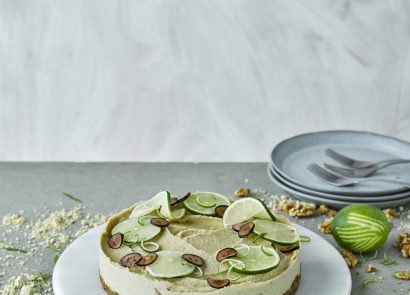We asked the experts what should be in our cupboards to help us overcome everything from fatigue to stress – here’s what they said
I’m feeling… stressed
Stress is becoming an epidemic in the UK, with 74 percent of adults reporting that they’ve felt so stressed over the past year they felt unable to cope, according to a YouGov survey.
What should I eat?
“A diet rich in veg, fruit, legumes, wholegrains and lean protein can help combat stress,” says nutritionist Rick Hay (rickhay. co.uk). “Blueberries contain polyphenols, which may help reduce stress and anxiety due to their anti-inflammatory properties – add them to your breakfast or eat them with a handful of nuts as a balanced snack. You can also try pumpkin seeds; as a source of potassium, they help to regulate the electrolyte balance in your body, which affects your mood.”
Anything else?
“Turmeric is the go-to spice in the wellness world, and for good reason,” says Rick. “The active ingredient in turmeric is curcumin, which may help to reduce inflammation and oxidative stress. Meanwhile, garlic is rich in antioxidants and helps combat oxidative stress.” A final note from Rick: “Stay away from processed foods, as they can impair your ability to tackle stress.”
I’m feeling… tired
When you’re rushing around and forget to eat, it’s inevitable that you’ll feel fatigued. The good news is you can swerve this by changing what’s on your plate.
What should I eat?
“For those who run on empty, or are fuelled up on caffeine or sugar, crashes in energy are to be expected,” says Alison Cullen, A.Vogel nutritionist and education manager (avogel.co.uk). “Start the day with porridge for a good dose of B vitamins, which are needed by the body as they convert food into energy. It’s a source of slow-release carbs too, which will help you feel fuller for longer. Salmon for dinner means you’re getting a good dose of protein, but also some anti-inflammatory omega 3. These fatty acids are highly concentrated in the brain, so upping your daily dose could help to support your cognitive functions, but also keep you feeling alert throughout the day. Good quality fats also help to slow gastric emptying, helping to keep us feeling full for longer and supplying a steadier stream of energy. Couple with carbohydrates to help slow the release of the glucose we need for energy.”
Anything else?
Healthspan head of nutrition Rob Hobson (healthspan.co.uk) advises eating wholegrains, lean proteins, healthy fats and vegetables, as well as magnesium-rich (another nutrient that can help convert food into energy) foods, such as nuts, seeds, green leafy vegetables, avocado, tofu and pulses.
I’m feeling…down
Although most people can feel low sometimes, if it’s affecting your life, it could be time to seriously address the issue. As well as doing things such as seeking support from your GP or friends and family and adding more movement today, you can also look at what you’re consuming.
What should I eat?
“Omega 3 fatty acids have been shown to play a helpful role in people who have been diagnosed with depression,” explains Dr Sarah Brewer, medical director at Healthspan (healthspan.co.uk). “One omega 3 fatty acid in particular, called DHA, forms a major structural component of the brain, and certain levels of it are vital for optimising brain performance and battling neurological disorders. The richest source of omega 3 is oily fish such as salmon, mackerel, trout and sardines. However, you can glean another type of omega 3 from plants, which is called AHA. This is found in foods such as nuts, seeds, quinoa, dark green leafy vegetables and soya beans, but it’s not easily converted in the body to more usable forms of DHA and EPA.”
Anything else?
A deficiency of vitamin D could be a cause of your feelings, adds Dr Sarah Brewer. “Low intakes of vitamin D have been shown to cause tiredness, fatigue and low mood. Vitamin D is also one of a collection of nutrients that help to support your immune system to function properly.” To boost your intake, eat foods such as eggs, cheese and mushrooms, or try a dietary supplement.
I’m feeling… Generally unwell
Supporting your immune system is something that often gets forgotten about until cold and flu season arrives. However, supporting your immunity throughout the year can help you stay healthy.
What should I eat?
In short, selenium-rich foods. “This mineral is required for the synthesis of antibodies and stimulates the production and activity of natural killer cells which help to fight infections,” says Dr Sarah. “A lack of selenium reduces the activity of these cells. In the UK, 46 percent of adults aged 65-74 and 60 percent of adults over 75 don’t get enough selenium in their diet, according to the UK National Diet and Nutrition Survey, so it’s important for these groups to up their intake. Try Brazil nuts, shellfish, tofu, mushrooms, wholewheat pasta and tomatoes.”
Anything else?
“Vitamin A is important for maintaining a healthy immune system,” says Dr Sarah. “It helps with immunity by maintaining the integrity of mucosal cells in the GI tract, eye and respiratory system – these act as a first line of defence. Vitamin A is required for the normal function of immune cells and the production of antibodies that respond to infection. This nutrient is found in animal foods, but beta carotene acts as a precursor to vitamin A, and can be found in orange and green veg (mangoes, orange peppers, dark green leafy vegetables, sweet potato, butternut squash), oily fish and eggs.”
I’m feeling… Sleep-deprived
With two thirds of UK adults suffering from disrupted nights, according to research by Aviva, it’s no wonder that many of us are left feeling sleep-deprived. There are lots of different ways of improving this, such as avoiding caffeine after 2pm and improving your bedtime routine, but you might not have considered that what you eat can help you get a good night’s sleep, too.
What should I eat?
“Tryptophan is an amino acid found in foods such as lean meat, tofu, bananas, cheese, nuts, seeds and milk,” says Rob. “This amino acid crosses to the brain where it is converted to serotonin which regulates melatonin (the sleep hormone ) production. Eating carbohydrate foods helps with the uptake of tryptophan into the brain, as this lessons the competition faced by tryptophan from other amino acids. A good meal to combine tryptophan with carbohydrates would be a chicken or tofu stirfry served with brown rice. You could also try making a night time hot chocolate – mix together cashew nut or dairy milk, cocoa powder and a little honey.”
Anything else?
“Vitamin B6 is a key nutrient for the nervous system, but it also helps the body to convert the amino acid tryptophan into serotonin,” explains Rob. “This is then used to regulate melatonin. You can find vitamin B6 in foods such as salmon, lean chicken breast, lean beef, sweet potatoes, avocado, pistachio nuts, bananas and tofu.”






















